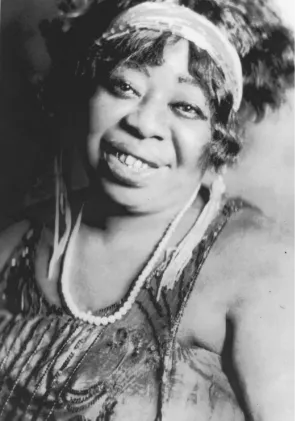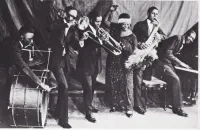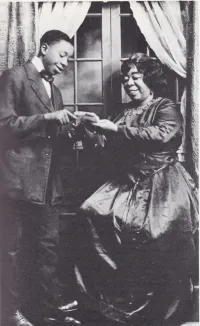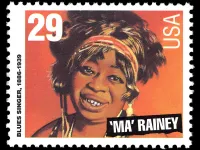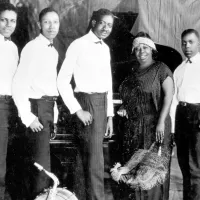Biography
1886 - 1939
“I can’t tell my future, so I’m going to tell my past.”
– Ma Rainey
Born as "Gertrude" in Columbus, Georgia in 1886, the future "Mother of the Blues" began performing with her family’s minstrel show at 14. At 18 she married singer Will “Pa” Rainey – and by default became “Ma” - but made no attempt to hide her love of women. Though not the first female blues singer, her raw emotional style is credited with the genre’s great rise in popularity. After 20 years touring the country with Pa, entertaining and singing, Ma signed a record deal with Paramount in 1923 and, over the next 6 years, recorded over 100 sides including ‘See See Rider Blues’, ‘Ma Rainey’s Black Bottom’, ‘Trust No Man’ and the telling ‘Prove it on Me Blues’: “Went out last night with a crowd of my friends. They must have been women, ‘cause I don’t like no men. Wear my clothes just like a fan. Talk to gals just like any old man…” Rainey loved dressing the part of a blues diva in sequins gowns with lots of jewelry and her trademark necklace of gold coins. In 1925 police raided a party she was hosting and found several undressed women engaged in “intimate” situations. Following the incident she was bailed out of jail by bisexual blues legend (and rumored lover) Bessie Smith. Having wisely saved her money, Ma retired from the road in 1933 and moved back to Georgia. She died of a heart attack 6 years later. As evidenced by her inductions into the Blues Hall of Fame in 1983 and the Rock & Roll Hall of Fame in 1990, her unmistakable style has influenced generations of musicians.
1886 - 1939
“I can’t tell my future, so I’m going to tell my past.”
– Ma Rainey
Born as "Gertrude" in Columbus, Georgia in 1886, the future "Mother of the Blues" began performing with her family’s minstrel show at 14. At 18 she married singer Will “Pa” Rainey – and by default became “Ma” - but made no attempt to hide her love of women. Though not the first female blues singer, her raw emotional style is credited with the genre’s great rise in popularity. After 20 years touring the country with Pa, entertaining and singing, Ma signed a record deal with Paramount in 1923 and, over the next 6 years, recorded over 100 sides including ‘See See Rider Blues’, ‘Ma Rainey’s Black Bottom’, ‘Trust No Man’ and the telling ‘Prove it on Me Blues’: “Went out last night with a crowd of my friends. They must have been women, ‘cause I don’t like no men. Wear my clothes just like a fan. Talk to gals just like any old man…” Rainey loved dressing the part of a blues diva in sequins gowns with lots of jewelry and her trademark necklace of gold coins. In 1925 police raided a party she was hosting and found several undressed women engaged in “intimate” situations. Following the incident she was bailed out of jail by bisexual blues legend (and rumored lover) Bessie Smith. Having wisely saved her money, Ma retired from the road in 1933 and moved back to Georgia. She died of a heart attack 6 years later. As evidenced by her inductions into the Blues Hall of Fame in 1983 and the Rock & Roll Hall of Fame in 1990, her unmistakable style has influenced generations of musicians.
Demography
Demography
Gender Female
Sexual Orientation Bisexual
Gender Identity Cisgender
Ethnicity African American Black
Faith Construct Protestant
Nations Affiliated United States
Era/Epoch Harlem Renaissance (1919-1929) Jazz Age (1910-1940) Roaring Twenties (1920-1929)
Field(s) of Contribution
Music
Commemorations & Honors
Posthumous Blues Foundation Hall of Fame Inductee (1983)
Posthumous Rock and Roll Hall of Fame Inductee (1990)
U.S. Postal Service Comemmorative Stamo Issued (1994)
See See Rider Blues Inducted Into the Grammy Hall of Fame (2004)
See See Rider Blues Added to the Library of Congress National Recording Registry (2004)
Rainey-McCullers School of the Arts Opened in Columbus Georgia Named After Getrude Rainey and Carson McCullers (2017)
Demography
Gender Female
Sexual Orientation Bisexual
Gender Identity Cisgender
Ethnicity African American Black
Faith Construct Protestant
Nations Affiliated United States
Era/Epoch Harlem Renaissance (1919-1929) Jazz Age (1910-1940) Roaring Twenties (1920-1929)
Field(s) of Contribution
Music
Commemorations & Honors
Posthumous Blues Foundation Hall of Fame Inductee (1983)
Posthumous Rock and Roll Hall of Fame Inductee (1990)
U.S. Postal Service Comemmorative Stamo Issued (1994)
See See Rider Blues Inducted Into the Grammy Hall of Fame (2004)
See See Rider Blues Added to the Library of Congress National Recording Registry (2004)
Rainey-McCullers School of the Arts Opened in Columbus Georgia Named After Getrude Rainey and Carson McCullers (2017)
Resources
Resources
Davis, Angela Y. Blues Legacies & Black Feminism. New York: Pantheon Books, 1998.
https://en.wikipedia.org/wiki/Ma_Rainey
https://www.nytimes.com/2019/06/12/obituaries/ma-rainey-overlooked.html
http://www.collectorsweekly.com/articles/singing-the-lesbian-blues-in-1920s-harlem/
https://www.billboard.com/articles/news/pride/7824784/ma-rainey-lesbian-lyrics
https://www.vogue.com/article/celebrate-the-birthday-of-blues-legend-ma-rainey
https://www.encyclopedia.com/people/literature-and-arts/music-popular-and-jazz-biographies/ma-rainey
Resources
Davis, Angela Y. Blues Legacies & Black Feminism. New York: Pantheon Books, 1998.
https://en.wikipedia.org/wiki/Ma_Rainey
https://www.nytimes.com/2019/06/12/obituaries/ma-rainey-overlooked.html
http://www.collectorsweekly.com/articles/singing-the-lesbian-blues-in-1920s-harlem/
https://www.billboard.com/articles/news/pride/7824784/ma-rainey-lesbian-lyrics
https://www.vogue.com/article/celebrate-the-birthday-of-blues-legend-ma-rainey
https://www.encyclopedia.com/people/literature-and-arts/music-popular-and-jazz-biographies/ma-rainey
